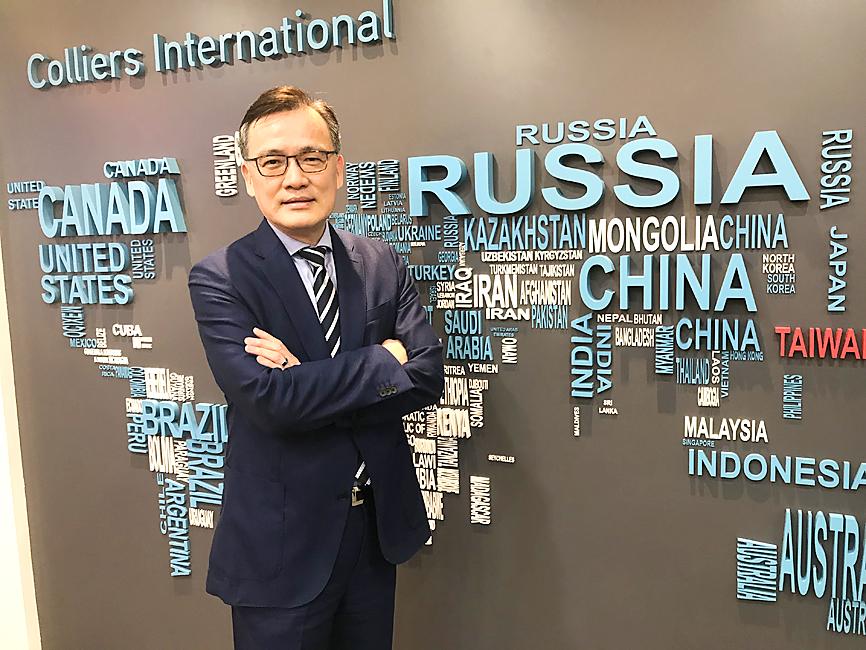Demand for warehouses and logistics facilities has spiked in the past few years, aided by booming online shopping and port congestion amid the COVID-19 pandemic, Colliers International Taiwan (高力國際) said yesterday.
The past three years have seen 22 major transactions of warehouses and logistics facilities valued at NT$29.94 billion (US$1.05 billion) and covering 209,100 ping (690,030m2), the size of 2.3 Daan Forest Parks in Taipei, the property broker said.
Colliers Taiwan managing director Andrew Liu (劉學龍) identified three investment approaches in warehouses and logistics facilities, namely by taking up the role of landlords, service providers and operators.

Photo: Hsu Yi-ping, Taipei Times
Cathay Life Insurance Co (國泰人壽) and Chunghwa Post Co (中華郵政) are landlords to several warehouses and logistics facilities that generate rental incomes equal to 4 percent of annual returns, Liu said.
Ally Logistic Property Co (永聯物流) offers warehousing and logistics solutions for clients in electronics and retail sectors, a business model that provides higher returns than rents, Liu said.
Meanwhile, companies such as food and beverage conglomerate Uni-President Enterprises Corp (統一企業), supermarket chain operator PX Mart Co Ltd (全聯實業) and e-commerce operator Momo.com Inc (富邦媒體) buy plots and build their own warehouses and logistics facilities to meet operational needs, Liu said, adding that their business scales are large and their pockets deep enough to warrant such a strategy.
Most warehousing deals are concentrated in Taoyuan’s Guanyin (觀音), Gueishan (龜山), Dasi (大溪) and Lujhu (蘆竹) districts; New Taipei City’s Wugu District (五股); Keelung; and Hsinchu’s Hukou Township (湖口), Collier Taiwan said.
Solid demand has pushed up industrial plot prices by 40 percent since 2018, the broker said.
Warehouses and logistics facilities are sparse in Taichung, Tainan and Kaohsiung, as well as Changhua County, but their numbers might increase in central and southern Taiwan in the coming years on the back of emerging industrial clusters and land scarcity in the north, Collier Taiwan said.
Industrial plots of more than 10,000 ping and near highway entrances are ideal sites for warehouses and logistics facilities, it said.
Apart from Cathay Life, Nan Shan Life Insurance Co (南山人壽) and Transglobe Life Insurance Co (全球人壽) also have displayed investment interest in warehouses and logistics facilities, it said.

Hon Hai Precision Industry Co (鴻海精密) yesterday said that its research institute has launched its first advanced artificial intelligence (AI) large language model (LLM) using traditional Chinese, with technology assistance from Nvidia Corp. Hon Hai, also known as Foxconn Technology Group (富士康科技集團), said the LLM, FoxBrain, is expected to improve its data analysis capabilities for smart manufacturing, and electric vehicle and smart city development. An LLM is a type of AI trained on vast amounts of text data and uses deep learning techniques, particularly neural networks, to process and generate language. They are essential for building and improving AI-powered servers. Nvidia provided assistance

DOMESTIC SUPPLY: The probe comes as Donald Trump has called for the repeal of the US$52.7 billion CHIPS and Science Act, which the US Congress passed in 2022 The Office of the US Trade Representative is to hold a hearing tomorrow into older Chinese-made “legacy” semiconductors that could heap more US tariffs on chips from China that power everyday goods from cars to washing machines to telecoms equipment. The probe, which began during former US president Joe Biden’s tenure in December last year, aims to protect US and other semiconductor producers from China’s massive state-driven buildup of domestic chip supply. A 50 percent US tariff on Chinese semiconductors began on Jan. 1. Legacy chips use older manufacturing processes introduced more than a decade ago and are often far simpler than

STILL HOPEFUL: Delayed payment of NT$5.35 billion from an Indian server client sent its earnings plunging last year, but the firm expects a gradual pickup ahead Asustek Computer Inc (華碩), the world’s No. 5 PC vendor, yesterday reported an 87 percent slump in net profit for last year, dragged by a massive overdue payment from an Indian cloud service provider. The Indian customer has delayed payment totaling NT$5.35 billion (US$162.7 million), Asustek chief financial officer Nick Wu (吳長榮) told an online earnings conference. Asustek shipped servers to India between April and June last year. The customer told Asustek that it is launching multiple fundraising projects and expected to repay the debt in the short term, Wu said. The Indian customer accounted for less than 10 percent to Asustek’s

Gasoline and diesel prices this week are to decrease NT$0.5 and NT$1 per liter respectively as international crude prices continued to fall last week, CPC Corp, Taiwan (CPC, 台灣中油) and Formosa Petrochemical Corp (台塑石化) said yesterday. Effective today, gasoline prices at CPC and Formosa stations are to decrease to NT$29.2, NT$30.7 and NT$32.7 per liter for 92, 95 and 98-octane unleaded gasoline respectively, while premium diesel is to cost NT$27.9 per liter at CPC stations and NT$27.7 at Formosa pumps, the companies said in separate statements. Global crude oil prices dropped last week after the eight OPEC+ members said they would